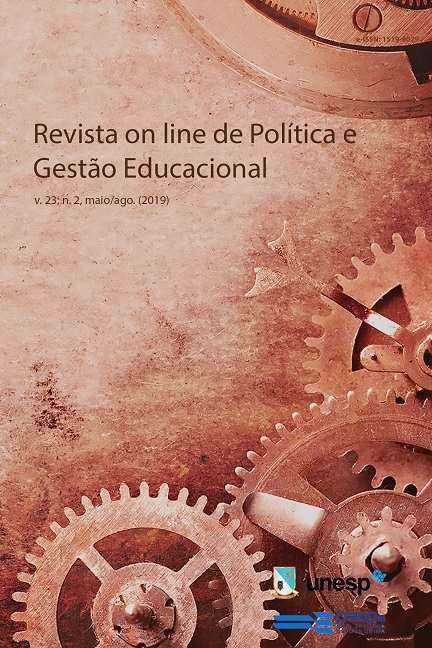Specialized educational assistance and regular education: teaching of interlocuciones with a view to the inclusion
DOI:
https://doi.org/10.22633/rpge.v23i2.12651Keywords:
Inserción, Professor, Specialized educational software.Abstract
The central theme of this text is the inclusion in the school space of a stigmatized minority. The objective is to reflect how the interlocution between teachers in the specialized Educational Service Room (ESA) and the regular classroom in the perspective of the inclusion of people with disabilities occurs. This is a descriptive study with a qualitative approach performed in schools of the municipal public system of Sobral-CE, having as participants 10 teachers using the questionnaire to collect the data. The results show that the teachers of the common teaching room and the AEE room must be in constant harmony, so that the goals are achieved, so that the work is interdisciplinary and collaborative. It is necessary to equip the school institutions for this care and, to invest in the training of teachers in the common teaching room and the specialized educational attendance room, which should promote the reception and inclusion of these children.Downloads
References
BRASIL. Política nacional de educação especial na perspectiva da educação inclusiva. Disponível em http://portal.mec.gov.br/index.php?option=com_docman&view=download&alias=16690-politica-nacional-de-educacao-especial-na-perspectiva-da-educacao-inclusiva-05122014&Itemid=30192. Acesso em 24 de maio de 2019.
BRASIL. Ministério da Educação. Secretaria de Educação Especial. Marcos Político-Legais da Educação Especial na Perspectiva da Educação Inclusiva. Brasília: Secretaria de Educação Especial, 2010.
BAZON, F. V. M. et al. Formação de formadores e suas significações para a educação inclusiva. Educ. Pesqui., São Paulo, v. 44, 2018. Acesso em: 30 abr. 2019.
CAMARGO, E. P. Inclusão social, educação inclusiva e educação especial: enlaces e desenlaces. Ciênc. educ., Bauru, v. 23, n. 1, p. 1-6, mar., 2017. Acesso em: 30 abril 2019.
GREGUOL, M.; MALAGODI, B. M.; CARRARO, A. Inclusão de Alunos com Deficiência nas Aulas de Educação Física: Atitudes de Professores nas Escolas Regulares. Rev. bras. educ. espec., Bauru, v. 24, n. 1, p. 33-44, mar., 2018. Acesso em: 30 abril 2019.
MARQUES DE OLIVEIRA, N. D. M.; CORDEIRO, A. F. M. O que pensam as equipes diretivas escolares sobre o Atendimento Educacional Especializado (AEE). Educ. rev.[online], v. 34, 2018. Acesso em: 20 abril 2019
MAZZOTTA, M.J.S; D’ANTINO, M.E.F. Inclusão social de pessoas com deficiências e necessidades especiais: cultura, educação e lazer. Saúde e Sociedade. São Paulo, v.20, n.2, p. 377-389, 2011.
MONICO, P. A.; MORGADO, L. A. S; ORLANDO, R. M. Formação inicial de professores na perspectiva inclusiva: levantamento de produções. Psicol. Esc. Educ., Maringá, v. 22, n. esp., p. 41-48, 2018. Acesso em: 30 abr. 2019.
MOUSINHO, R; SCHMID, E; MESQUITA, F; PEREIRA, J; MENDES, L; SHOLL, R.; NÓBREGA, V. Mediação Escolar e inclusão: revisão, dicas e reflexões. Revista de Psicopedagogia, São Paulo, v. 27, n. 82, p. 02-08, 2010. Acesso em: 22 nov. 2017.
PELOSI, M. B.; NUNES, L. O. P. Caracterização dos professores itinerantes, suas ações na área de tecnologia assistiva e seu papel como agente de inclusão escolar. Revista Brasileira de Educação Especial, Marília, v.15, n.1, p. 141-154, 2009. Acesso em: 28 jul. 2018.











